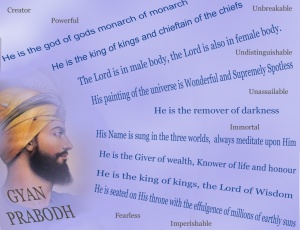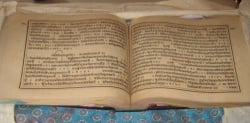Gyan Parbodh
Gian Prabodh (Guide to Enlightenment), included in Guru Gobind Singh`s Dasam Granth, is a long shabad written in Braj employing sixteen different metres. It comprises two independent pans. The name given to the sixth Bani in the second holy scriptures of the Sikhs called the Dasam Granth (lit. Book or Collected writings of the Tenth Master). This text spans from page 325 to page 643 of the 1478 pages of this holy book of the Sikhs. (Original text is about 1428 pages).
- The first, i.e. the introductory one (stanzas 1 to 125), begins with a laudation of the Almighty who is depicted as Supreme, beyond comprehension, non dual, infinite, invisible, unattached, desireless and fearless. The Supreme Being is the Creator and Succourer of the universe, and the Embodiment of Supreme Bliss. He is beyond Time and beyond retribution over karma. All pilgrimages, practices of yoga, renunciation of the world, are meaningless without His being remembered.
- The second part consists of 211 stanzas (126-336), each a quatrain with the exception of two couplets (250 and 253). The theme of this part is the practical philosophy of the world. The expositions are professed in the form of highly metaphysical dialogues, between Jivatman and Paramatman, and the nature of atman and the fourfold worldly dharma, i.e. politics {raj dharma), charity (dan dharma), household life (BHOG dharma) and liberation (moksa dharma) all of which are defined.
How this fourfold religion of man is to be lived is illustrated from the legends of the Mahabharata and from the tales of the successors of Yudhishhira and his brothers; Priksit, Janmejya and his son, Ajai Singh, born of a concubine.
| Sri Dasam Granth Sahib (ਦਸਮ ਗ੍ਰੰਥ ਸਾਹਿਬ) |
| Banis |
| Jaap - Akal Ustat - Bachitar Natak - Chandi Charitar Ukat(i) Bilas - Chandi Charitar 2 - Chandi di Var - Gyan Parbodh - Chobis Avatar - Brahm Avtar - Rudar Avtar - Sabad Patshahi 10 - 33 Swaiyey - Khalsa Mahima - Shastar Nam Mala - Ath Pakhyan Charitar Likhyate - Zafarnama - Hikayats |
| Other Related Banis |
| Bhagauti Astotar - Ugardanti - Sri Kaal Chopai - Lakhi Jungle Khalsa - Asfotak Kabits - Sahansar Sukhmana - Vaar Malkauns Ki - Chandd Patshahi 10 |
| History |
| Historical Sources - Memorials - Anti Dasam |
| Philosophical aspects |
| Idol Worship - Pilgrimages - Chandi - Triya - Shastar |
| Scholar Views |
| Singh Sabha Lahore - Bhai Kahn Singh Nabha - Professor Sahib Singh - Bhai Veer Singh - Jarnail Singh Bhindrawale - |
| Critics |
| Ram Raaiyas of Payal - Teja Singh Bhasod - Gyani Bhag Singh Ambala - Professor Darshan Singh |
Another highly devotional ballad comprising 336 verses, Guru Gobind Singh ji praises the qualities of the Almighty. The text then deals with a dialogue the soul has with the King of Souls (the Almighty), where emotions, the play of various eras (Satyug, Treta, Dwapur and Kalyug) are discussed. The four facets of Dharm (righteousness) are deliberated (Bhog, Raaj, Dhaan, and Mokh). However, only Dhaan Dharam has been discussed, the other 3 facets have not, which leads many to believe this work is unfinished.
Gobind Sadan on Gian Prabodh
This composition has two main divisions. The first part is devoted to the praise of the Almighty God, He who is all prevading, Omniscient and Omnipotent. His various attributes, His might, magnanimity and his greatness are the subject of this part of Gyan Prabodh. The entire description follows the tradition of gurbani and elucidates the main ideas that are presented within it.
The second part is in the form of a dialogue in which the soul questions God about that super power whose radiance and glory is unending. The answers are all within. He is without differences of caste, creed, religion. For Him friend and foe are alike.
Then the soul asks about the four dharmas in answer the four dharmas are elaborated upon. These are Raj dharma, Daan dharma, Bhog dharma and Mokh dharma. Giving examples from the lives of great personalities as mentioned in the various scriptures about Daan Dharam have been explained to the soul. The writing also is a source of knowledge and wisdom since in it we find elucidated the various kinds of Yagnas that were performed and how they were performed. This information is very significant since no other source of information regarding these exists. This is an incomplete piece of writing because the three other dharmas mentioned have not been elaborated upon.
Shabads
Gyan Parboh Shabad 1
here are few famous lines often sung by Bhai Inderjit Singh Khalsa from this Gurbani
ਨਹੀ ਜਾਨ ਜਾਈ ਕਛੂ ਰੂਪ ਰੇਖੰ ॥
His form and mark cannot be comprehended at all.
(ਉਸ ਦਾ) ਕੁਝ ਵੀ ਰੂਪ ਅਤੇ ਆਕਾਰ ਜਾਣਿਆ ਨਹੀਂ ਜਾ ਸਕਦਾ,
ਕਹਾ ਬਾਸੁ ਤਾ ਕੋ ਫਿਰੈ ਕਉਨ ਭੇਖੰ ॥
Where doth He live? and in what guise He moves?
(ਨਾ ਇਹ ਪਤਾ ਲਗਦਾ ਹੈ ਕਿ) ਉਸ ਦਾ ਵਾਸ ਕਿਥੇ ਹੈ ਅਤੇ ਕਿਹੜੇ ਭੇਸ ਵਿਚ ਫਿਰ ਰਿਹਾ ਹੈ;
ਕਹਾ ਨਾਮ ਤਾ ਕੋ ਕਹਾ ਕੈ ਕਹਾਵੈ ॥
What is His Name? and how is He called?
ਉਸ ਦਾ ਕੀ ਨਾਂ ਹੈ ਅਤੇ ਕੀ ਕਰ ਕੇ ਜਾਣਿਆ ਜਾਂਦਾ ਹੈ।
ਕਹਾ ਮੈ ਬਖਾਨੋ ਕਹੈ ਮੈ ਨ ਆਵੈ ॥੬॥
What should I say? I lack expression.6.
ਮੈਂ (ਉਸ ਦਾ) ਕੀ ਬਖਾਨ ਕਰਾਂ (ਕਿਉਂਕਿ ਉਹ) ਕਥਨ ਵਿਚ ਨਹੀਂ ਆਉਂਦਾ ॥੬॥
Gyan Parbodh Shabad 2
Here Iare the lines which directly explain the words of Jaap sahib
ਕਬਿਤੁ ॥ ਤ੍ਵਪ੍ਰਸਾਦਿ ॥
KABIT : BY THY GRACE
ਕਬਿੱਤ: ਤੇਰੀ ਕ੍ਰਿਪਾ ਨਾਲ:
ਗਹਿਓ ਜੋ ਨ ਜਾਇ ਸੋ ਅਗਾਹ ਕੈ ਕੈ ਗਾਈਅਤੁ ਛੇਦਿਓ ਜੋ ਨ ਜਾਇ ਸੋ ਅਛੇਦ ਕੈ ਪਛਾਨੀਐ ॥
He, who cannot be grasped, He is called Inaccessible and He, who cannot be assailed is recognized as unassailable.
ਜਿਸ ਨੂੰ ਪਕੜਿਆ ਨਾ ਜਾ ਸਕੇ, ਉਸ ਨੂੰ 'ਅਗਾਹ' ਕਿਹਾ ਜਾਂਦਾ ਹੈ, ਜੋ ਛੇਦਿਆ ਨਾ ਜਾ ਸਕੇ ਉਸ ਨੂੰ 'ਅਛੇਦ' ਨਾਂ ਨਾਲ ਪਛਾਣਨਾ ਚਾਹੀਦਾ ਹੈ।
ਗੰਜਿਓ ਜੋ ਨ ਜਾਇ ਸੋ ਅਗੰਜ ਕੈ ਕੈ ਜਾਨੀਅਤੁ ਭੰਜਿਓ ਜੋ ਨ ਜਾਇ ਸੋ ਅਭੰਜ ਕੈ ਕੈ ਮਾਨੀਐ ॥
He who cannot be destroyed is known as indestructible and He, who cannot be divided in considered as indivisible.
ਜੋ ਤੋੜਿਆ ਨਾ ਜਾ ਸਕੇ ਉਸ ਨੂੰ 'ਅਗੰਜ' ਵਜੋਂ ਜਾਣਿਆ ਜਾਂਦਾ ਹੈ, ਜੋ ਭੰਨਿਆ ਨਾ ਜਾ ਸਕੇ ਉਸ ਨੂੰ 'ਅਭੰਜ' ਨਾਂ ਨਾਲ ਮੰਨਣਾ ਚਾਹੀਦਾ ਹੈ।
ਸਾਧਿਓ ਜੋ ਨ ਜਾਇ ਸੋ ਅਸਾਧਿ ਕੈ ਕੈ ਸਾਧ ਕਰ ਛਲਿਓ ਜੋ ਨ ਜਾਇ ਸੋ ਅਛਲ ਕੈ ਪ੍ਰਮਾਨੀਐ ॥
He, who cannot be disciplined, may be called incorrigible and He, who cannot be deceived is considered as Undeceivable.
ਜੋ ਸਾਧਿਆ ਨਾ ਜਾ ਸਕੇ ਉਸ ਨੂੰ 'ਅਸਾਧ' ਕਿਹਾ ਜਾਂਦਾ ਹੈ, ਜੋ ਛਲਿਆ ਨਾ ਜਾ ਸਕੇ, ਉਸ ਨੂੰ 'ਅਛਲ' ਨਾਂ ਨਾਲ ਯਾਦ ਕਰਨਾ ਚਾਹੀਦਾ ਹੈ।
ਮੰਤ੍ਰ ਮੈ ਨ ਆਵੈ ਸੋ ਅਮੰਤ੍ਰ ਕੈ ਕੈ ਮਾਨੁ ਮਨ ਜੰਤ੍ਰ ਮੈ ਨ ਆਵੈ ਸੋ ਅਜੰਤ੍ਰ ਕੈ ਕੈ ਜਾਨੀਐ ॥੧॥੪੦॥
He, who is without the impact of mantras (incantations) may be considered as Unspellable and He, who is without the impact of Yantras (mystical diagrams) may be known as Unmagical.1.40.
ਜੋ ਮੰਤਰਾਂ ਵਿਚ ਨਾ ਆ ਸਕੇ, ਉਸ ਨੂੰ 'ਅਮੰਤ੍ਰ' ਕਰਕੇ ਮੰਨਿਆ ਜਾਂਦਾ ਹੈ, ਜੋ ਯੰਤਰ ਵਿਚ ਨਾ ਆ ਸਕੇ, ਉਸ ਨੂੰ 'ਅਜੰਤ੍ਰ' ਨਾਂ ਨਾਲ ਜਾਣਨਾ ਚਾਹੀਦਾ ਹੈ ॥੧॥੪੦॥
ਜਾਤ ਮੈ ਨ ਆਵੈ ਸੋ ਅਜਾਤ ਕੈ ਕੈ ਜਾਨ ਜੀਅ ਪਾਤ ਮੈ ਨ ਆਵੈ ਸੋ ਅਪਾਤ ਕੈ ਬੁਲਾਈਐ ॥
Consider Him as casteless in Thy mind, Who is devoid of caste, call Him lineageless who is devoid of lineage.
(ਜੋ ਕਿਸੇ) ਜਾਤਿ ਵਿਚ ਨਹੀਂ ਆਉਂਦਾ, ਉਸ ਨੂੰ 'ਅਜਾਤਿ' ਕਰ ਕੇ ਦਿਲ ਵਿਚ ਜਾਣੀਦਾ ਹੈ ਅਤੇ ਜੋ ਪਾਤਿ (ਪੰਕਤੀ) ਵਿਚ ਨਹੀਂ ਆਉਂਦਾ, ਉਸ ਨੂੰ 'ਅਪਾਤ' ਕਹਿ ਕੇ ਬੁਲਾਈਦਾ ਹੈ।
ਭੇਦ ਮੈ ਨ ਆਵੈ ਸੋ ਅਭੇਦ ਕੈ ਕੈ ਭਾਖੀਅਤੁ ਛੇਦ੍ਯੋ ਜੋ ਨ ਜਾਇ ਸੋ ਅਛੇਦ ਕੈ ਸੁਨਾਈਐ ॥
He may be called as Indiscriminate, who is devoid of discriminations He, who cannot be assailed, may be spoken as Unassailable.
(ਜੋ) ਭੇਦ ਵਿਚ ਨਹੀਂ ਆਉਂਦਾ, ਉਸ ਨੂੰ 'ਅਭੇਦ' ਕਹਿ ਕੇ ਬੁਲਾਈਦਾ ਹੈ ਅਤੇ ਜੋ ਛੇਦਿਆ ਨਹੀਂ ਜਾ ਸਕਦਾ, ਉਸ ਨੂੰ 'ਅਛੇਦ' ਕਹਿਣਾ ਚਾਹੀਦਾ ਹੈ।
ਖੰਡਿਓ ਜੋ ਨ ਜਾਇ ਸੋ ਅਖੰਡ ਜੂ ਕੋ ਖਿਆਲੁ ਕੀਜੈ ਖਿਆਲ ਮੈ ਨ ਆਵੈ ਗਮੁ ਤਾ ਕੋ ਸਦਾ ਖਾਈਐ ॥
He, who cannot be divided, may be considered as indivisible He, who cannot be grasped in thought, always makes us sorrowful.
ਜੋ ਖੰਡਿਆ ਨਾ ਜਾਏ, ਉਸ 'ਅਖੰਡ' ਜੀ ਦਾ ਧਿਆਨ ਕਰਨਾ ਚਾਹੀਦਾ ਹੈ ਅਤੇ (ਜੋ) ਖ਼ਿਆਲ ਵਿਚ ਨਾ ਆ ਸਕੇ, ਉਸ ਦਾ ਸਦਾ ਗ਼ਮ (ਚਿੰਤਾ) ਖਾਣਾ ਚਾਹੀਦਾ ਹੈ।
ਜੰਤ੍ਰ ਮੈ ਨ ਆਵੈ ਅਜੰਤ੍ਰ ਕੈ ਕੈ ਜਾਪੀਅਤੁ ਧਿਆਨ ਮੈ ਨ ਆਵੈ ਤਾ ਕੋ ਧਿਆਨੁ ਕੀਜੈ ਧਿਆਈਐ ॥੨॥੪੧॥
He, who is without the impact of mystical diagrams, may be muttered as Unmagical He who doth not come in contemplation, may be contemplated upon and meditated.2.41.
(ਜੋ) ਯੰਤਰ ਵਿਚ ਨਾ ਆ ਸਕੇ, ਉਸ ਨੂੰ 'ਅਜੰਤ੍ਰ' ਕਰ ਕੇ ਜਪਣਾ ਚਾਹੀਦਾ ਹੈ। ਅਤੇ (ਜੋ) ਧਿਆਨ ਵਿਚ ਨਾ ਆ ਸਕੇ, ਉਸ ਨੂੰ ਧਿਆਨ ਵਿਚ ਰਖ ਕੇ ਧਿਆਉਣਾ ਚਾਹੀਦਾ ਹੈ ॥੨॥੪੧॥
We have just scratchd the surface, more to come....
External Links
References
- Loehlin, C.H.. The Granth of Guru Gobind Singh find the KHALSA Brotherhood. Lucknow, 1971
- Ashta, Dliaram Pal, The Poetry of the DASAM GRANTH. Delhi, 1959
- Jaggi, Ratan Singh, Dasam Granth Pnrichaya. Delhi, 1990


